Book contents
- Frontmatter
- Contents
- Preface
- 1 Conflicts in grammars
- 2 The typology of structural changes
- 3 Syllable structure and economy
- 4 Metrical structure and parallelism
- 5 Correspondence in reduplication
- 6 Output-to-output correspondence
- 7 Learning OT grammars
- 8 Extensions to syntax
- 9 Residual issues
- References
- Index of languages
- Index of subjects
- Index of constraints
7 - Learning OT grammars
Published online by Cambridge University Press: 05 June 2012
- Frontmatter
- Contents
- Preface
- 1 Conflicts in grammars
- 2 The typology of structural changes
- 3 Syllable structure and economy
- 4 Metrical structure and parallelism
- 5 Correspondence in reduplication
- 6 Output-to-output correspondence
- 7 Learning OT grammars
- 8 Extensions to syntax
- 9 Residual issues
- References
- Index of languages
- Index of subjects
- Index of constraints
Summary
Introduction
Generative theory assumes that the grammars of individual languages are all variations on a single theme, that of Universal Grammar. By hypothesis, UG is innate rather than acquired, and hence it defines the range of possibilities within which natural languages fall. From this viewpoint the study of first language acquisition becomes of crucial relevance to the study of natural language, as it may offer a window onto properties of UG, hence into the human language faculty. The central issue in first language acquisition is this: how do principles of UG determine the acquisition process?
In previous studies, this issue of language acquisition has been approached from a variety of viewpoints and methods. Some researchers study data from children's language, while others consider the preconditions that are necessary to make a grammar learnable.
One field of investigation is based on the collection of data from children's speech, in the form of corpora of spontaneous speech, or elicited through experimental methods. Researchers study these data in close connection with assumptions about UG, and attempt to establish the relevant properties of UG which guide the child during her acquisition of the target grammar (Nouveau 1994, Demuth 1995, Gnanadesikan 1995, Goad 1997).
The second field of investigation, which we will actually focus on in this chapter, is learnability. Here the central issue is what formal and substantive properties of universal grammar make it possible that grammars of individual languages can actually be learned.
- Type
- Chapter
- Information
- Optimality Theory , pp. 296 - 340Publisher: Cambridge University PressPrint publication year: 1999

